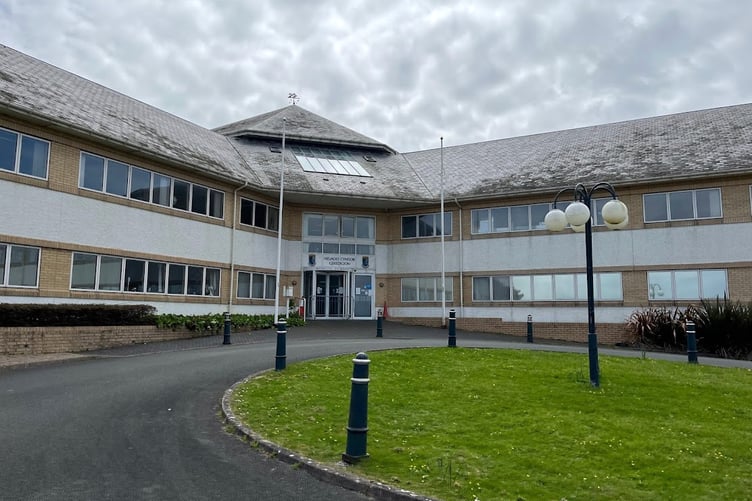WE HAVE been here before.
Nineteen months ago, in a fit of blind pique, Ceredigion council fired off a litany of baseless complaints about the Cambrian News to the Independent Press Standards Organisation.
They thought they had the newspaper cornered with their daft allegations of bias. It took the regulator, which threw out the entirety of the authority’s mischievous concoction, to point out to them how wrong they were.
Now the council has thrown another tantrum as, unchastened by its 2023 humiliation, it takes a renewed stab at press freedom, and thereby at the public’s right to know precisely what the authority is doing in its name.
For more than a month, the council has refused repeated requests by the Cambrian News for information on the future of Lampeter university campus, following the paper’s disclosure that chief executive Eifion Evans, seemingly acting with something close to autocratic zeal, is spearheading an approach to the Welsh government seeking funding to enable the council to buy the campus, perhaps for use as a sixth-form centre, while at the same time initiating moves to sell off five residential properties in Aberystwyth after receiving an “offer from a third party”.
These are all matter of intense and legitimate public interest, and the council’s information blackout is therefore hugely irresponsible. Secrecy over the Lampeter manoeuvrings is a matter of deep concern to campaigners trying to safeguard the University of Wales Trinity St David campus.
This is presumably exactly the kind of maverick conduct calculated to undermine local democracy that the Welsh Local Government Association had in mind when it lambasted the council earlier this year for “ineffective communication” with the public and a “disconnect between backbench members and the executive/senior leadership teams.”
The WLGA should now recognise, and react to, a serious and worrying malfunctioning of this council on two counts.
Primarily, it should be thoroughly alarmed by the authority’s arrogant, but ultimately futile, attempt to interfere with the functioning of an unfettered press.
At the same time, it should condemn the shocking behind-the-scenes activity over the Lampeter campus and Aberystwyth properties as a denial of proper democratic oversight by a council leadership which clearly sees itself as heading a quasi private business built on an assumption of hierarchical control dismissive of public involvement.
Specifically, what is this “offer from a third party”? If publicly-owned buildings are to be sold off, there is no question but that they must go on the open market, not disposed of in a way that invites accusations of sleaze.
These sales must not go ahead in the way planned, and the council’s refusal to release any details of the properties involved because, they plead, the subject is “commercially sensitive” can safely be set aside as a predictable ruse to cover tracks.
Eifion Evans and his troupe of well-drilled cabinet forelock-tuggers are by all accounts deeply displeased by the outspoken liveliness of the Cambrian News in its healthily unrestrained observations of what the council leadership gets up to.
Particular discomfort seems to have attached to a column by editor Mick O’Reilly on 14 May which presented a general indictment of the council’s lousy performance “at senior levels”. This, it’s thought, triggered the information blackout which, disgracefully, persists across some headings.
A wise council would learn from its mistakes. But of course Ceredigion council doesn’t admit to mistakes.
So when they have stopped stamping their feet and bawling “We don’t like you, so we’re not going to talk to you anymore” they will find themselves, as with the press standards fiasco, on the wrong side of history.
JOURNALIST, best-selling author of political thrillers and former MI6 agent, Freddie Forsyth was hot on press freedom.
In 1967, he covered the Nigerian civil war between Biafra and Nigeria for the BBC. His six-month stint over, he asked for more time.
He recalled: “I was told quite bluntly, then: ‘It is not our policy to cover this war’. This was a period when the Vietnam war was front-page headlines almost every day, and this particularly British cock-up in Nigeria was not going to be covered. I smelt news-management. I don't like news-management.”
Forsyth, who has died aged 86, quit and returned to Biafra as a freelance. Later, back in London, I ran into him - a watchful character in a voluminous trench-coat - on a dark, blustery evening in Camden as we sought out the inaugural meeting of the Save Biafra Campaign.
So is news-management of this calibre still a force at the BBC? It looks like it. Famine in Gaza follows months of bombing, making normal provision and distribution of food impossible. Bombing has led to famine. Why has the BBC made so little of the connection? Arms exports to Israel, principally by the US, are the elephant in the room.
Last September, Britain banned some arms exports to Israel but excluded parts for the F-35 fighter-jet, which has been bombing Gaza and its civilian population. A high court case - its outcome awaited - tests whether UK government ministers broke the law by continuing to make available to Israel components for this aircraft.
The BBC has scarcely touched on the court case. Forsyth, I think, would have smelt news-management.





Comments
This article has no comments yet. Be the first to leave a comment.